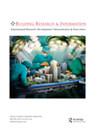Challenges to business ecosystem alignment when implementing solar photovoltaic systems in the Swedish built environment
IF 3.7
3区 工程技术
Q1 CONSTRUCTION & BUILDING TECHNOLOGY
引用次数: 0
Abstract
Implementing solar photovoltaic systems in the built environment (BEPV) is critical for the construction sector’s contribution to mitigating climate change. While previous studies give various insights into innovation implementation, the challenges to value co-creation by construction actors remain underexplored. By studying the alignment of business ecosystems implementing BEPV in the Swedish built environment, we address this need. Drawing on the cumulative experience of construction actors, this study demonstrates how knowledge mislocation, knowledge deficits, cultural discrepancies, insufficient building codes, frequently changing regulations, and implementing a highly embedded innovation can disturb ecosystem alignment. The study contributes to the ecosystem literature, scholarly discussions of innovation implementation in complex construction projects, and the PV diffusion literature by offering insights into the realignment of ecosystems involving value co-creation by actors from previously unconnected industries. The study links PV diffusion research to the construction management literature by exploring the cumulative experience of implementation at the micro level. We highlight the significant industry reconfigurations required to accommodate a deeply embedded technological innovation, reconfigurations going beyond the challenges of implementing systemic innovations encumbered by fewer material dependencies. We also emphasize the critical importance of industrial interaction, coordination, and learning to accelerate the sustainability transition.在瑞典建筑环境中实施太阳能光伏系统时对商业生态系统一致性的挑战
在建筑环境中实施太阳能光伏系统(BEPV)对于建筑行业减缓气候变化的贡献至关重要。虽然以前的研究对创新实施提供了各种见解,但建筑参与者共同创造价值的挑战仍未得到充分探讨。通过研究在瑞典建筑环境中实施BEPV的商业生态系统的一致性,我们解决了这一需求。本研究利用建筑参与者的累积经验,展示了知识错位、知识缺失、文化差异、建筑规范不足、法规频繁变化以及实施高度嵌入的创新如何扰乱生态系统的一致性。该研究为生态系统文献、复杂建设项目创新实施的学术讨论以及光伏扩散文献做出了贡献,提供了对生态系统的重新调整的见解,这些生态系统涉及以前不相关行业的参与者共同创造的价值。本研究将光伏扩散研究与施工管理文献联系起来,探索微观层面实施光伏扩散的累积经验。我们强调了适应深度嵌入技术创新所需的重大行业重组,重组超越了实施系统性创新的挑战,这些创新受到较少物质依赖的阻碍。我们还强调产业互动、协调和学习对加速可持续转型至关重要。
本文章由计算机程序翻译,如有差异,请以英文原文为准。
求助全文
约1分钟内获得全文
求助全文
来源期刊

Building Research and Information
工程技术-结构与建筑技术
CiteScore
8.60
自引率
7.70%
发文量
43
审稿时长
>12 weeks
期刊介绍:
BUILDING RESEARCH & INFORMATION (BRI) is a leading international refereed journal focussed on buildings and their supporting systems. Unique to BRI is a focus on a holistic, transdisciplinary approach to buildings and the complexity of issues involving the built environment with other systems over the course of their life: planning, briefing, design, construction, occupation and use, property exchange and evaluation, maintenance, alteration and end of life. Published articles provide conceptual and evidence-based approaches which reflect the complexity and linkages between cultural, environmental, economic, social, organisational, quality of life, health, well-being, design and engineering of the built environment.
 求助内容:
求助内容: 应助结果提醒方式:
应助结果提醒方式:


